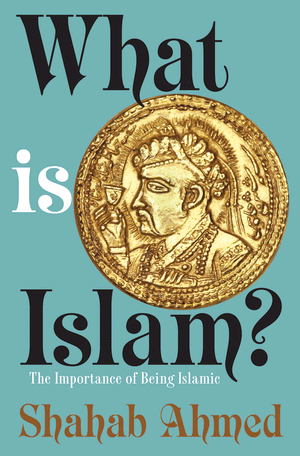
What is Islam? The Importance of Being Islamic. By Shahab Ahmed. New Jersey: Princeton University Press. Pp609. HB. 2016. £22.00.
Until his premature death at the age of 48, Shahab Ahmed was a postdoctoral associate in the Aga Khan Program for Islamic Architecture at Harvard University. Born in Singapore of Pakistani parentage, the author was educated in England, Malaysia, Egypt and the United States. He completed his doctorate in Islamic Studies at Princeton University in 1999. His cosmopolitan background and upbringing enabled him to learn more than half a dozen languages including English, Arabic, Urdu, Punjabi, Persian and Turkish and, in the process, he absorbed religious, philosophical, cultural, literary and poetic wisdom from the East as well as the West.
This is a complex, repetitive and an unusual book, and as such it would require more time and a longer review to do full justice to it. The author had completed it just before his death. To some extent it is a product of his own diverse personal and educational journey as much as it is an attempt on his part to make sense of his faith within the framework of its universality.
Even before its publication, the author of this book had been hailed as ‘a rare scholar’ and ‘the most brilliant and creative scholar of Islam in his generation’, while, according to others, he was a ‘revisionist’ who attempted to completely conceptually redefine Islam, its history, culture and thought in the light of a new analytical paradigm (hermeneutical engagement) that challenges current, dominant understandings or readings of Islam that projects it variously as ‘religion’, ‘culture’, ‘scripture’ or ‘law’. But are such assessment or observation of Shahab Ahmed’s contribution fair and accurate or are they unduly exaggerated and hyperbolic?
Divided into three parts and six chapters as well as a short preface and a concluding statement summarising its main arguments, this book is an interesting but equally bewildering contribution. Its originality lies in the fact that the author focuses his attention on ‘the mutually constitutive relationship between Islam and Muslims: on how Islam makes Muslims as Muslims make Islam’ (p543) by drawing on the unusually rich and hugely diverse Muslim history, culture and literary heritage spanning over fifteen centuries of Islam.
The book is also strange because it begins with six questions (see pages 5-109) which enable the author to demonstrate the fact that diversity of interpretation and understanding of Islam has been a part and parcel of Muslim intellectual heritage throughout its history. What’s so original about that, I hear you say! I must admit, the author’s justification for his reconceptualisation of Islam is far from being new or cogent. Unsurprisingly, although the title of the book is: What is Islam?, the author does not answer that question at all because he is more interested in broadening the definition of Islam – and therefore identifying what is or is not Islamic in his own understanding – rather than defining it as such.
In the author’s own words, ‘This book has sought not so much to define, as to bring into definition – to bring into view, to discern and to descry – Islam in its plenitude of meaning. Islam, meaning-making for the self by one-fifth of humanity, is Islam – it is not anything else – and should be conceptualized, understood and appreciated as such; in terms which cohere with its meanings and by which its meanings cohere.’ (p545-6)
In other words, the author’s new conceptualisation of Islam projects it as being both unified and diverse, and coherent and contradictory. To prove his point he provides numerous historical, cultural, literary and poetic examples drawn from the Islamic East as well as from the ‘Balkan-to-Bengal complex’ with some being more powerful and cogent while the other examples are more controversial, if not highly questionable. And even if we were to accept the author’s understanding and interpretation of the historical, cultural, literary and poetic heritage of the Muslim world as being representative and accurate, nonetheless he does not satisfactorily address the question of unity and coherence within the multiplicity of Islam or, for that matter, make sense of diversity and incoherence when the demand for coherence is fundamentally a religious one, rather than rational?
One of the strengths of this book, however, is that it demonstrates very convincingly that the Muslim world is far from being homogeneous and monolithic. Rather the ‘conceptualization of Islam as theoretical object and analytical category that maps meaningfully onto Islam as a human and historical phenomenon – a human and historical phenomenon characterized and constituted, not merely by immense variety and diversity, but by the prodigious presence of outright contradiction…whether as religion, as culture, as civilization, as discursive tradition, as core beliefs, as whatever-Muslims-say-it-is, as a law-centered phenomenon, as so plural and various as to be “Islams-not-Islam,”…’ (p543) is a powerful and pertinent point that deserves more thought and reflection at a time when so much chaos, disorder and discord has gripped the Muslim world. Muslims – of all shades and colour – have no choice other than to live in peace and harmony with their differences, and that message needs to reverberate across the Islamic world today more than ever before!
This is an interesting, well-written and thought-provoking book, but it is far from being a pioneering study or a game-changer. I also found the author’s habit of italicising words to emphasize his points or reinforce his message very irritating and unnecessary. This feature of the book needs to be rectified in a future edition.
Muhammad Khan M Khan is currently completing a book on the Muslim heritage of the West (forthcoming, Kube Publishing).